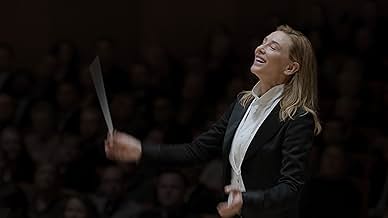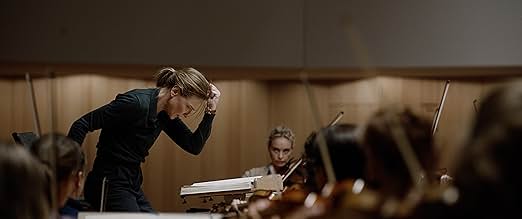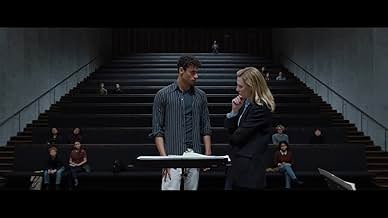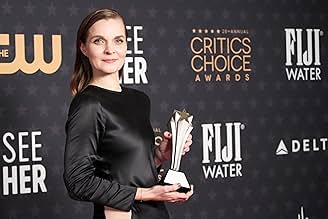Situado no mundo internacional da música clássica ocidental, o filme é centrado em Lydia Tár, amplamente considerada uma das maiores compositoras-regentes vivas e a primeira diretora musical... Ler tudoSituado no mundo internacional da música clássica ocidental, o filme é centrado em Lydia Tár, amplamente considerada uma das maiores compositoras-regentes vivas e a primeira diretora musical de uma grande orquestra alemã.Situado no mundo internacional da música clássica ocidental, o filme é centrado em Lydia Tár, amplamente considerada uma das maiores compositoras-regentes vivas e a primeira diretora musical de uma grande orquestra alemã.
- Direção
- Roteirista
- Artistas
- Indicado a 6 Oscars
- 79 vitórias e 271 indicações no total
Zethphan D. Smith-Gneist
- Max
- (as Zethphan Smith-Gneist)
Alec Baldwin
- Alec Baldwin
- (narração)
Avaliações em destaque
It is not surprising that this film is tanking at the box office since it is much too long and slow paced for the average movie goer's attention span. Indeed parts of it, like the agonizingly protracted opening scene where a New Yorker magazine music critic interviews the title character about her classical music esthetics, seem designed by writer/director Tod Field as a boredom experiment wherein if you can survive it without running and screaming into the night out of sheer and utter ennui then you are worthy to see the rest of his "masterpiece".
Thing is, though, that a lot of this film does approach, if not encroach upon, masterpiece territory. Certain scenes, like Lydia Tar's bleak Staten Island homecoming where she summons the spirit of her mentor Leonard Bernstein in an effort to recapture the humanistic values she has lost, are genuinely heartbreaking. And the sequences that deal with Lydia's manipulation of her acolytes are difficult to watch as we see how artistic power feels even more corruptible, somehow, than the political kind, perhaps because it is a profanation of a purer space.
And I think we can all agree that Cate Blanchett is one helluva fine actor! As are Nina Hoss, Noemie Merlant and Sophie Kauer who play various of her entourage/victims.
Bottom line: For all its faults I have a sneaking suspicion that in twenty years they'll be watching this and not "The Fabelmans". Give it a B plus.
Thing is, though, that a lot of this film does approach, if not encroach upon, masterpiece territory. Certain scenes, like Lydia Tar's bleak Staten Island homecoming where she summons the spirit of her mentor Leonard Bernstein in an effort to recapture the humanistic values she has lost, are genuinely heartbreaking. And the sequences that deal with Lydia's manipulation of her acolytes are difficult to watch as we see how artistic power feels even more corruptible, somehow, than the political kind, perhaps because it is a profanation of a purer space.
And I think we can all agree that Cate Blanchett is one helluva fine actor! As are Nina Hoss, Noemie Merlant and Sophie Kauer who play various of her entourage/victims.
Bottom line: For all its faults I have a sneaking suspicion that in twenty years they'll be watching this and not "The Fabelmans". Give it a B plus.
Everybody writing about this mock biopic focuses on Cate Blanchett's knock-it-out-of-the-park performance, but when compared to Field's "Little Children" (2006), "Tár" lacks the storytelling and editing skills which make the earlier film a masterpiece of human relations, whereas the latter is an interesting character study that somehow collapses under its own weight.
There's a strong establishing scene showing Tár demolishing an aspiring musician's conceited views on Bach, yet one has to wait for a long time for a follow-up showing the main character's boundary issues. The central topic emerges rather quickly (abuse of power), but there are diversions which support character development, yet drag on the narrative, which is probably why many reviews here find the film frustrating.
Being an ex-Berliner, I like the fact that the city is being used as a real location as opposed to the usual tourist / Cold War hot spots, and the Philharmonics rehearsal scenes are very well done, but they don't really push the story forward and could have easily been wound down a bit.
Nina Hoss as Tár's partner is a brilliant counterpoint, because she keeps a good deal of her thoughts to herself until she doesn't, so more focus on their relationship would have helped the story. Hoss would deserve a supporting actress Academy Award nod if only she had more screen time.
The initial scene of conflict eventually loops back into focus, and Field could have used this to explore societal misjudgment as he did in "Little Children" - but he doesn't, which makes "Tár" rather distant and cold. Field expects viewers to interpret a lot on their own, which is bold and demanding, but with this approach it is crucial to keep focus on an underlying message, otherwise it gets lost.
In conclusion, "Tár" has all the ingredients for a masterpiece - interesting characters, great performances, nice camerawork - but weak storytelling ultimately reduces the film's potential.
There's a strong establishing scene showing Tár demolishing an aspiring musician's conceited views on Bach, yet one has to wait for a long time for a follow-up showing the main character's boundary issues. The central topic emerges rather quickly (abuse of power), but there are diversions which support character development, yet drag on the narrative, which is probably why many reviews here find the film frustrating.
Being an ex-Berliner, I like the fact that the city is being used as a real location as opposed to the usual tourist / Cold War hot spots, and the Philharmonics rehearsal scenes are very well done, but they don't really push the story forward and could have easily been wound down a bit.
Nina Hoss as Tár's partner is a brilliant counterpoint, because she keeps a good deal of her thoughts to herself until she doesn't, so more focus on their relationship would have helped the story. Hoss would deserve a supporting actress Academy Award nod if only she had more screen time.
The initial scene of conflict eventually loops back into focus, and Field could have used this to explore societal misjudgment as he did in "Little Children" - but he doesn't, which makes "Tár" rather distant and cold. Field expects viewers to interpret a lot on their own, which is bold and demanding, but with this approach it is crucial to keep focus on an underlying message, otherwise it gets lost.
In conclusion, "Tár" has all the ingredients for a masterpiece - interesting characters, great performances, nice camerawork - but weak storytelling ultimately reduces the film's potential.
If you are not familiar with classical music, probably almost the entire first hour will be very difficult to sit through. The dialogue is PACKED with references to classical music artists/works/history/etc. Not to mention there are constant little allusions to different plot threads which make up Tar's whole story.
However, this dies down gradually and the movie becomes much more focused and simple. Blanchett is incredible, but not in a showy way at all. Her conducting moments were awesome. The story is political and relevant, and handled very well and balanced-like.
There is a surprisingly creepy vibe to the film, that borders on something almost like a horror movie at times. It's quite unnerving.
One of the best movies i've seen all year! Probably Todd Field's best work yet.
However, this dies down gradually and the movie becomes much more focused and simple. Blanchett is incredible, but not in a showy way at all. Her conducting moments were awesome. The story is political and relevant, and handled very well and balanced-like.
There is a surprisingly creepy vibe to the film, that borders on something almost like a horror movie at times. It's quite unnerving.
One of the best movies i've seen all year! Probably Todd Field's best work yet.
During the first minute of this film, Cate Blanchett shows what an extraordinary actress she is. Her character, star conductor Lydia Tár, is waiting to go onstage. There is no dialogue, only body language. But even without words, Blanchett shows what Tár thinks and feels.
Blanchett's remarkable performance is a large part of what makes this a good movie. But there's more. The very clever script gives us a lot to chew on afterards. Tár is a woman in the men-dominated world of classical music. She's not warm, empathic or even very sympathetic. In fact, she has many characteristics that are usually associated with men. She's vain, selfish and manipulative. And that's what gets her in trouble. At the start of the film, she seems to be one of the most admired women in the world. She is extremely famous and successful. At the end, everything has fallen apart.
The film doesn't judge. It leaves it up to the viewer to decide if Lydia Tár is a victim or a culprit. Or maybe both at the same time. The viewer gets a lot of information to make up his (or her) mind. Director Todd Field gives us the story elements slowly, bit by bit. Take the scene where Lydia Tár gives a stern speech to a young girl who bullies her daughter. It shows that she is used to getting everyone in line, according to her wishes. That's useful information to interpret things later on in the movie.
Tár is very much a modern movie. It has things to say about gender, about power, about social media, about being woke. But at the same time, it's a very old-fashioned movie. It takes its time. There are long scenes, and long takes. There's nothing modern in the way it is filmed. And that's a good thing.
Blanchett's remarkable performance is a large part of what makes this a good movie. But there's more. The very clever script gives us a lot to chew on afterards. Tár is a woman in the men-dominated world of classical music. She's not warm, empathic or even very sympathetic. In fact, she has many characteristics that are usually associated with men. She's vain, selfish and manipulative. And that's what gets her in trouble. At the start of the film, she seems to be one of the most admired women in the world. She is extremely famous and successful. At the end, everything has fallen apart.
The film doesn't judge. It leaves it up to the viewer to decide if Lydia Tár is a victim or a culprit. Or maybe both at the same time. The viewer gets a lot of information to make up his (or her) mind. Director Todd Field gives us the story elements slowly, bit by bit. Take the scene where Lydia Tár gives a stern speech to a young girl who bullies her daughter. It shows that she is used to getting everyone in line, according to her wishes. That's useful information to interpret things later on in the movie.
Tár is very much a modern movie. It has things to say about gender, about power, about social media, about being woke. But at the same time, it's a very old-fashioned movie. It takes its time. There are long scenes, and long takes. There's nothing modern in the way it is filmed. And that's a good thing.
Initially I was put off by Tár-it's cryptic, drab, and sluggish. Until I realized what the filmmakers were actually accomplishing. No spoilers in this review, but to enjoy the film you have to know certain things:
1. Yes, Cate Blanchett is fantastic and rightfully deserves the accolades.
2. The film is the slowest of slow burns.
3. The film does not hold your hand.
4. The film's narrative cuts out key elements of scenes that other filmmakers would have highlighted. This was the sticking point for me-it didn't dawn on me until halfway through the film what was happening. If you know this going in, I believe you'll have a better experience with the film. The film purposefully *doesn't* show you the "important" elements of scenes or relationships between characters. You have to figure that out yourself, just like putting together the puzzle of who Lydia Tár actually is. Here's a quick non-related example:
Bill stared at the smoke in the frying pan.
Bill rubbed his nose five times and took a call from Ernest while sipping coffee at Station 271.
If those two sentences above were in a book, it would be leaving out major plot points that other authors would have filled in. First, there was a fire in Bill's kitchen. He called the fire department. He had to evacuate, so the fire may have been bad. And who is Ernest, if we have not been introduced to that character before? Why is bill rubbing his nose so much? Is it a tick or OCD or nervous habit?
That's what Tár is like. It presents to you all the items "between the lines" and lets you solve for X for yourself. Once I understood that that was the dominant cinematic approach in this film, it became immensely more enjoyable...and challenging. Very much worth your time if you put in the effort.
1. Yes, Cate Blanchett is fantastic and rightfully deserves the accolades.
2. The film is the slowest of slow burns.
3. The film does not hold your hand.
4. The film's narrative cuts out key elements of scenes that other filmmakers would have highlighted. This was the sticking point for me-it didn't dawn on me until halfway through the film what was happening. If you know this going in, I believe you'll have a better experience with the film. The film purposefully *doesn't* show you the "important" elements of scenes or relationships between characters. You have to figure that out yourself, just like putting together the puzzle of who Lydia Tár actually is. Here's a quick non-related example:
Bill stared at the smoke in the frying pan.
Bill rubbed his nose five times and took a call from Ernest while sipping coffee at Station 271.
If those two sentences above were in a book, it would be leaving out major plot points that other authors would have filled in. First, there was a fire in Bill's kitchen. He called the fire department. He had to evacuate, so the fire may have been bad. And who is Ernest, if we have not been introduced to that character before? Why is bill rubbing his nose so much? Is it a tick or OCD or nervous habit?
That's what Tár is like. It presents to you all the items "between the lines" and lets you solve for X for yourself. Once I understood that that was the dominant cinematic approach in this film, it became immensely more enjoyable...and challenging. Very much worth your time if you put in the effort.
Você sabia?
- CuriosidadesProfessional cellist Sophie Kauer had no prior acting experience and auditioned at the encouragement of a friend. She learned to act by watching YouTube tutorials hosted by Michael Caine.
- Erros de gravaçãoWhen Lydia is talking to the two technicians after a rehearsal in Berlin, she requests they send her audio and video recordings, but the console in front of them in the booth is actually for controlling lights, not audio/video.
- Cenas durante ou pós-créditosThe opening credits presents the film crew and acknowledgments (usually shown at the end titles) without presenting the actors. The actors and soundtrack are shown at the ending without the crew.
- ConexõesEdited from A Bruxa de Blair (1999)
- Trilhas sonorasDas Wohltemperierte Klavier: Präludium and Fuge C-Dur, BWV 846
Written by Johann Sebastian Bach
Piano, Cate Blanchett
Principais escolhas
Faça login para avaliar e ver a lista de recomendações personalizadas
- How long is Tár?Fornecido pela Alexa
Detalhes
- Data de lançamento
- País de origem
- Centrais de atendimento oficiais
- Idiomas
- Também conhecido como
- Tar
- Locações de filme
- Dresden, Saxônia, Alemanha(Kulturpalast & Großen Garten Platz)
- Empresas de produção
- Consulte mais créditos da empresa na IMDbPro
Bilheteria
- Orçamento
- US$ 25.000.000 (estimativa)
- Faturamento bruto nos EUA e Canadá
- US$ 6.773.650
- Fim de semana de estreia nos EUA e Canadá
- US$ 158.620
- 9 de out. de 2022
- Faturamento bruto mundial
- US$ 29.177.163
- Tempo de duração
- 2 h 38 min(158 min)
- Cor
- Mixagem de som
- Proporção
- 2.39 : 1
Contribua para esta página
Sugerir uma alteração ou adicionar conteúdo ausente



































